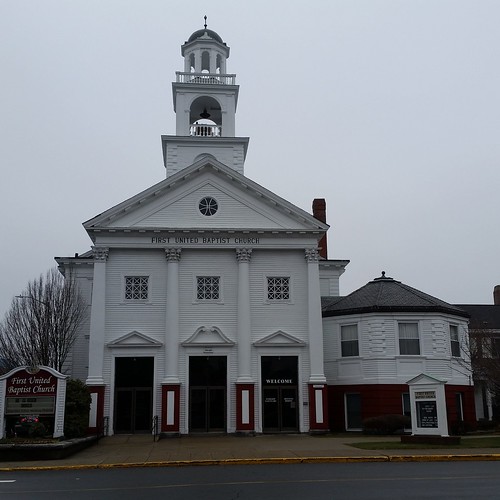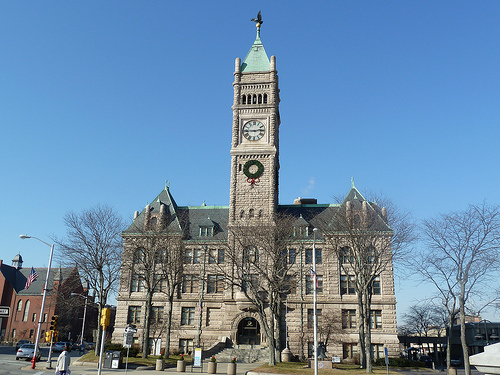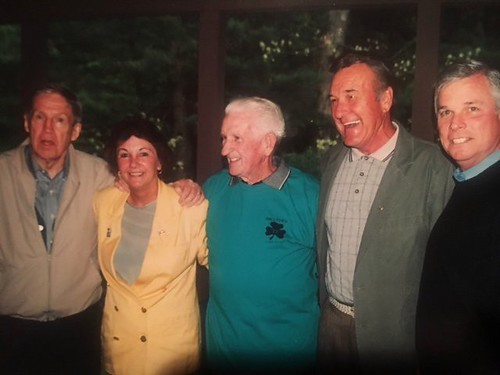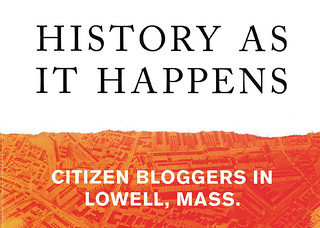Lowell Week in Review: April 8, 2018

First United Baptist Church, Lowell, Mass.
Martin Luther King Jr. in Lowell
This past Wednesday – April 4, 2018, was the 50th anniversary of the murder of Martin Luther King Jr. in Memphis, Tennessee. Did you know that Dr. King preached in Lowell on Sunday, April 12, 1953? He was in the midst of his doctoral studies at Boston University and travelled to Lowell and gave the sermon at the First United Baptist Church on Church Street.
The Martin Luther King, Jr. Papers Project at Stanford University contain this draft of a letter of a March 1953 letter:
Rev. Otto R. Loverude
First United Baptist Church
Church and George Streets
Lowell, Mass.
Dear Rev. Loverude:
This is to acknowledge your letter of February 18. Following your suggestion I will use as a subject at the 5:30 discussion group: “What it means to be a Negro in the South.” My subject for the regular evening service will be: “What does It mean to believe in God?”
I am very happy to be able to serve you and your church and I will look forward to this occasion with great anticipation. Please feel free to contact me about any additional information. I would appreciate it very much if you would give me some directions as to getting to the church. I will be driving out.
Sincerely yours,
Martin L. King Jr.
But in 1953, King had not received the national acclaim that came later, so the “Church News” report in the Friday, April 10, 1953 Lowell Sun says only this:
First United Baptist Church
Nursery opens at 10:20 am. Morning worship at 10:30 o’clock. Sermon, “Our Christian Covenant,” by the pastor, Rev. Otto Loverude. Communion service and reception of new members. Extended session for children’s department at 11:10 am. Church school for young people and adult classes at 11:45 am. Junior high and senior high Fellowship will join with the congregation of the college of missions at 5:30 pm. Supper hour at 6 pm.
In the book, African American Religious Thought: An Anthology, edited by Cornel West and Eddie Glaude, a footnote says “King gave this sermon at First United Baptist Church in Lowell, Massachusetts, on April 12, 1953.” I’ve ordered the book from interlibrary loan. When it arrives, I’ll report on the content of the sermon.
No matter what you study in history, you can usually find a Lowell connection.

Contracts and City Managers
Whether a city manager “gets a contract” is always a big issue in Lowell. Last week’s council agenda contained an item, “update regarding Manager Contract,” which struck me as amusing given our contract/no contract fixation. Whoever posted that item on the agenda must have read my Week in Review last Sunday where I suggested it be called an “employment agreement” even though a contract and an agreement are the same thing. Sure enough, this week’s agenda contains this item: “Vote to execute the Employment Agreement between the city of Lowell and incoming City Manager Eileen Donoghue.”
If a person agrees to work for you and you agree to pay them for that work, then you have a contract and such contracts can be verbal or in writing. I think the word “contract” in the context of Lowell City Managers has obtained an entirely different meaning. When someone says, “I don’t want to give the city manager a contract,” that means “I don’t want the city manager to have a contract for a fixed number of years, but want the city manager to be employed at will, meaning the manager’s employment could be terminated any time.”
This distinction – employment for a fixed term or employment at will – dictates whether the city will have a “professional” or a “political” city manager. When people in Lowell talk about a “professional” city manager, they are referring to someone who has made a career in appointed positions in municipal management and has a degree in public administration or something similar. By “political” city manager, they mean someone with extensive government service albeit in elected, rather than appointed office and with advanced degrees which are not necessarily in the public administration field.
Someone in the profession of municipal management would be hesitant to take a position “at will” as opposed to one with the job security of a fixed term of years. Such a person would likely be moving from elsewhere, an expensive proposition that would be disruptive to family life. On the other hand, someone who has gained experience in municipal management while serving in elected office tends to be more accepting of “at will” employment. It’s likely that person already lives here, so relocation is not an issue. Also, the “political” person is experienced in the randomness of electoral politics in which, for a state legislator, you could lose the election (and your job) every two years.
In Lowell, history has shown that excellent city managers can come from either background. But whether a manager is deemed to be successful or not has more to do with the city council than it does with the education and job experience of that manager.
As for incoming City Manager Donoghue, it looks like we’ll have to wait until Tuesday night to find out whether she gets a contract.
Be sure to check back here on Monday morning for Mimi Parseghian’s Lowell City Council preview to find out what else will come before the council this coming Tuesday night.

May 2003: Former Mayors Richard Howe Sr, Rita Mercier, Robert Maguire, Armand LeMay and Brian Martin (Photo from Mike Maguire)
Mayor Maguire
Former Mayor of Lowell Robert Maguire passed away on March 31, 2018. Maguire was first elected to the Lowell City Council in 1965, an election which brought in six new councilors: Maguire, John Cox, Thomas Crowley, Richard Howe Sr., Raymond Gilbride, and former Councilor Sam Pollard (for whom the Pollard Memorial Library is named). They joined incumbents Edward Early, George O’Meara and Thomas O’Donnell.
Maguire was reelected in 1967 and was elected by his colleagues to serve as mayor during that two year term. He lost reelection in 1969, an election in which five incumbents lost and six new councilors were elected. Maguire skipped the 1971 election but returned to the council in 1973, finishing a strong fifth. He lost again in 1975, along with four of his colleagues, in a continuing 1970s pattern of ousting incumbents and then electing them again. That’s what happened to Bob Maguire in 1977, when he again returned to the council.
Reelected in 1979, Maguire was elected by his colleagues to serve as mayor, the second time he held that position. The 1980 mayoral election took three ballots and many shifting votes. On the first ballot in the mayoral voting, Sam Pollard had the votes of Maguire, Richard Howe, Armand LeMay and himself. Robert Kennedy received votes from Ray Rourke, Tom Casey and himself. Ray Lord voted for Armand LeMay and Brendan Fleming voted for himself. On the second ballot, Maguire voted for himself and all the other votes stayed the same. On the third ballot, Lord, LeMay, Rourke and Casey all switched to Maguire, giving him five votes. Pollard retained Howe’s vote and added Kennedy. Fleming voted for himself throughout.
Maguire was reelected to the council in 1981 but resigned in January, 1983, to become the administrator of the Lowell Regional Transit Authority.
Because Bob Maguire and my dad, Richard Howe Sr., were both elected to the city council for the first time in 1965, and because the Maguire and Howe families both lived on Wilder Street, not too far apart, I knew Bob Maguire for most of my life. But my favorite story about him involves me being 3,500 miles away.
In January, 1981, I was serving in a US Army electronic intelligence unit in West Germany. Most of the time, I worked in a SCIF (Secure Compartmented Information Facility) that was below ground and had the radio constantly playing on speakers pointed towards all vents as a way to defeat any listening devices. One day, the lead story on AFN (Armed Forces Network) news was, Today, Mayor Robert Maguire of Lowell, Massachusetts declared a state of emergency and closed down all schools due to the extreme cold and the shortage of natural gas for heating.”
While I sympathized with the people of Lowell, I thought it was pretty neat that the lead story broadcast to the 300,000 American troops then in Europe involved my home town of Lowell.
From what I can gather, on a Saturday morning in January, the Lowell Gas Company placed a full-page ad in the Lowell Sun warning customers of an imminent shortage of natural gas. The ad went on to instruct everyone to lower thermostats and the city to cancel school for several days due to the extreme cold. The city did do that, as was reported on AFN, but city councilors were outraged at the suddenness of this crisis and suspicions were that the gas company had made some serious miscalculations and had delayed alerting the city to the looming problem.

Social Media in Lowell
Are you on Facebook? Twitter? Instagram? Where do you get your local news? How do you communicate with your friends and neighbors in the city? Who makes good use of electronic communications in Lowell? How could it be done better?
Those are all topics for discussion next Sunday, April 15, 2018, at 2 pm at Lowell National Park Visitor Center, when Paul Marion, Marie Sweeney, Tony Accardi and I, the four original contributors of this blog, lead a discussion on social media in Lowell: A Short History of Social Media in Lowell: Bloggers, Tweeters and Facebookers. The starting point will be our book, History as It Happens: Citizen Bloggers in Lowell, Mass., but we want the event to be a community forum on social media. The more people who attend, the better, so please join us next Sunday.
I just finished the most interesting fiction book about Martin Luther King Jr. “The Bishops Pawn” by Steve Berry opens up an interesting theory to his death.